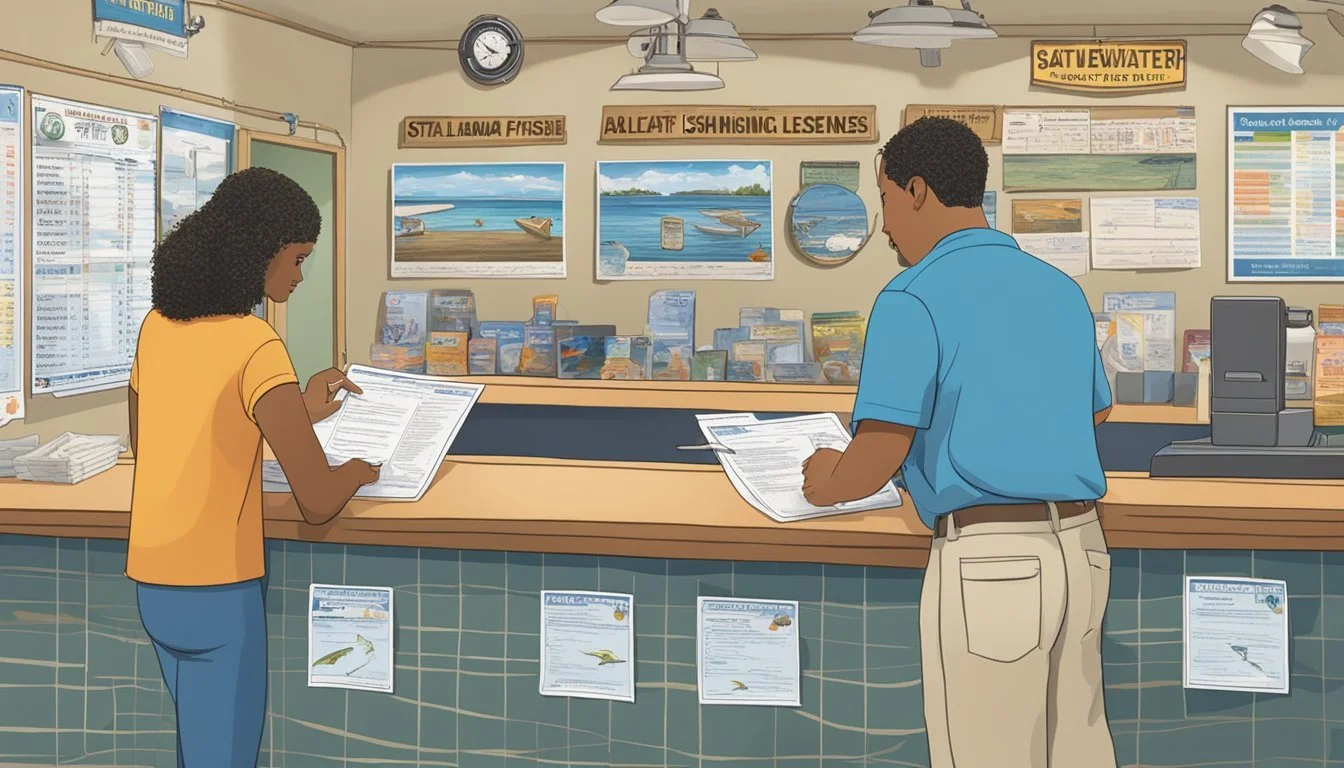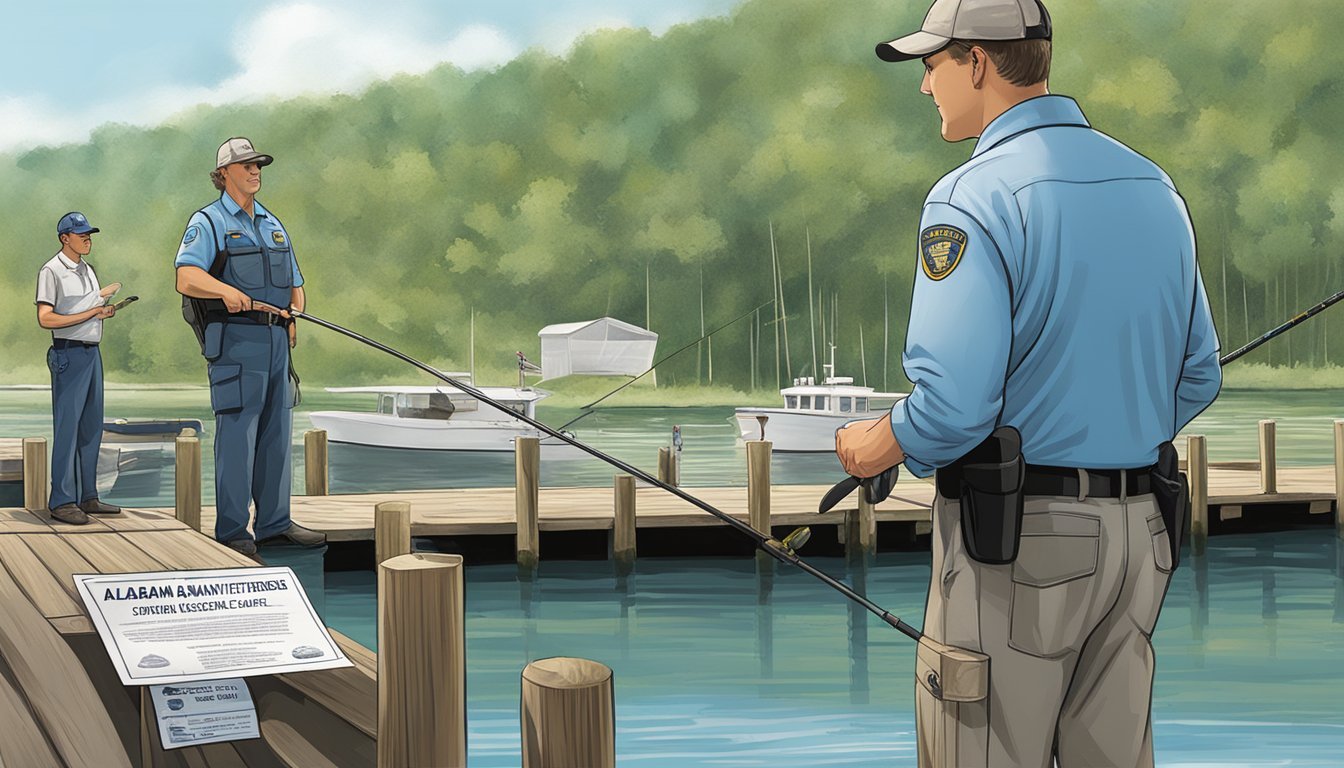How to Get an Alabama Saltwater Fishing License
Your Simple Guide
Anglers looking to hook into the bountiful saltwater game off the coast of Alabama are required to obtain a saltwater fishing license. This essential credential is a legal requirement for residents aged 16 and over not covered by exemptions such as individuals over 65, those possessing a lifetime saltwater license, or anglers fishing on piers with a pier-specific license. It's a straightforward process, ensuring that both the state's marine resources are sustainably managed and that recreational fishers can enjoy their activity with the assurance of compliance with state regulations.
The state of Alabama provides several avenues by which an angler can secure a saltwater fishing license. These licenses remain valid from September 1 to August 31 of the following year, aligning closely with the fishing seasons and regulatory periods. Residents are determined based on their driver's license, and even those visiting can acquire their license to cast a line in Alabama's diverse saline waters. Whether targeting the popular largemouth bass or other species, a license is a key step in planning a fishing trip in Alabama's coastal waters.
Securing a license is not only about legality; it represents an angler's contribution to conservation efforts. Funds from license purchases aid in habitat restoration, fish (What wine goes well with fish?) stock monitoring, and educational programs, all of which culminate in the protection and enhancement of Alabama's saltwater fishery. With a variety of convenient options available for purchase, including online platforms and local authorized agents, obtaining a saltwater fishing license in Alabama is easy and accessible for anglers.
Understanding Fishing Licenses in Alabama
Obtaining a fishing license in Alabama is a straightforward process, but anglers must understand the distinction between saltwater and freshwater licenses, as well as the specific requirements and exemptions for residents and non-residents.
Saltwater vs Freshwater Licensing
In Alabama, anglers need to determine the type of water they plan to fish in, as there are separate licenses for saltwater and freshwater environments. Freshwater licenses are required for fishing in inland waters, whereas saltwater licenses are necessary when fishing in the Gulf of Mexico and other designated saltwater areas. Each license type is available for purchase with options such as annual or one-week durations.
License Requirements for Residents
Residents between the age of 16 and 64 need to purchase an appropriate fishing license to fish in Alabama waters. Non-residents, including visitors to the state, over the age of 16 also require a license. For residents, the cost structure and validity period differ based on the type of license (saltwater or freshwater) they choose to apply for.
Understanding Exemptions
Certain groups are exempt from the requirement of holding a fishing license in Alabama. For saltwater fishing, both residents and non-residents under the age of 16 are not required to have a license. Additionally, residents aged 65 and over are exempt. It is important for anglers to verify their exemption status before heading out to ensure compliance with state regulations.
How to Purchase an Alabama Saltwater Fishing License
When looking to fish in Alabama's saltwater regions, anglers must ensure they have the appropriate licenses. The process for obtaining an Alabama saltwater fishing license is straightforward and can be done online, in-person, or through licensed agents.
Online Purchase
Anglers can purchase a saltwater fishing license online through the Alabama Department of Conservation and Natural Resources (ADCNR) website. They will need a credit card or debit card to complete the transaction. Here's a simple step-by-step to buy the license online:
Visit the official ADCNR online portal.
Enter your state of residency and date of birth.
Select the appropriate license type.
Complete payment with a credit or debit card.
Print the license or keep a digital copy on a mobile device.
In-Person Purchase
Licenses can also be obtained in person at any Probate Office or License Commissioner's Office in the state. This option is suitable for those who prefer a direct interaction or may not have access to online services. The following list includes steps for in-person purchase:
Locate the nearest Probate or License Commissioner's Office.
Provide identification and residency information as required.
Pay for the license with cash, credit, or debit card.
Receive a printed copy of the saltwater fishing license.
Buying from License Agents
Finally, licensed agents, including retail stores such as Walmart, also sell Alabama saltwater fishing licenses. These agents provide an easy and accessible option for purchasing the necessary licenses, often in conjunction with a shopping trip. For this method:
Visit a participating retail store or licensed agent.
Request the specific saltwater license you need.
Provide payment and receive the physical license.
Different Types of Alabama Fishing Licenses
There are several categories of saltwater fishing licenses in Alabama catering to different needs and durations. These licenses are mandatory for anyone wishing to fish in saltwater areas of the state, with specific options available for residents, non-residents, and individuals with disabilities.
Annual Licenses and Fees
Annual saltwater fishing licenses are available for both residents and non-residents. Residents can purchase an annual license for $26.50. These licenses are valid for the entire license year, ending August 31. For non-residents, an annual license has a higher fee and the cost can vary.
Lifetime Licenses
A lifetime license is an option for those Alabama residents who are serious about fishing and wish to avoid the yearly renewal process. Lifetime licenses prices are determined based on the age of the applicant. The state also issues lifetime licenses to disabled veterans under special programs, recognizing their service.
Trip and Daily Licenses
Besides annual and lifetime options, there are daily fishing licenses for short-term anglers. These trip licenses are perfect for tourists or occasional fishers who are not looking for long-term commitments. These licenses are typically more affordable but are only valid for the specified number of days.
Special Licenses for Disabled Anglers
Alabama also offers special fishing license fees for disabled anglers, providing them with the opportunity to engage in fishing activities at reduced costs. These licenses ensure that individuals with disabilities, including disabled veterans, can participate in saltwater fishing, supporting inclusivity within the sport.
Additional Endorsements and Registrations
When purchasing an Alabama saltwater fishing license, anglers should be aware of additional endorsements and registrations that may be required depending on the target species and fishing activities.
Reef Fish Endorsement
Anglers targeting reef fish in the Gulf of Mexico are required to obtain a Reef Fish Endorsement. This endorsement is necessary for individuals who fish for certain reef species, such as red snapper, grouper, and amberjack. It is a separate addition that must be included with the Alabama saltwater fishing license.
Saltwater Angler Registration
All saltwater anglers fishing from a private vessel in Alabama waters need to comply with the Saltwater Angler Registration. This registration is free and mandatory for both residents and non-residents who are required to have a saltwater fishing license. The Saltwater Angler Registration helps in the conservation of marine resources and is crucial for the management of Alabama's saltwater fisheries.
Costs and Fees Associated with Fishing Licenses
When planning to fish in Alabama's saltwater regions, anglers should be aware of the costs involved in obtaining the required licenses. Both residents and non-residents must consider standard license pricing as well as any potential discounts or exemptions that may apply.
Standard License Pricing
The cost for a standard Alabama saltwater fishing license for residents typically begins at $24.35. Non-residents can expect to pay a starting fee of approximately $51.70 for a comparable annual license. These fees are crucial to maintaining the state's natural aquatic resources and providing quality fishing opportunities. Fees may vary slightly due to transaction handling or processing charges. It's important for anglers to check current rates and purchase the appropriate license before their fishing excursion.
Resident Annual Saltwater Fishing License: $24.35
Non-Resident Annual Saltwater Fishing License: $51.70
Discounts and Exemptions for License Fees
Alabama offers certain exemptions and discounts for fishing license fees that can significantly reduce the cost for eligible individuals. Senior citizens, disabled persons, and active-duty military personnel are among those who may qualify for discounts or may not be required to purchase a license at all. For example:
Senior Citizens: Residents over age 65 may be exempt from licensing fees.
Disabled Persons: Various discounts; requires proof such as a Disability Exemption License.
Active-Duty Military: Discounts available; certain conditions apply.
Youths under the age of 16 do not require a license to fish in Alabama waters. Additionally, some special events like Free Fishing Day allow for fishing without a license. Anglers should always verify their eligibility for exemptions and discounts through the official state channels or consult with the Alabama Department of Conservation and Natural Resources for the latest information on fee schedules and exemptions.
Regulations and Conservation Efforts
Alabama's saltwater fishing regulations are designed to ensure sustainable fishing practices and to bolster conservation efforts. These rules safeguard the aquatic resources and contribute to the state's wildlife heritage.
Bag and Size Limits
In Alabama, bag and size limits are strictly imposed to prevent overfishing and to maintain healthy fish populations. These limits vary by species and are periodically updated to reflect the current state of fish stocks. For instance, certain game fish may have a daily bag limit, which specifies the maximum number of fish an angler can keep in a day, as well as a size limit, ensuring only fish of a certain size are harvested. Adhering to these limits is crucial for the conservation of Alabama's diverse marine life.
Fishing License Contribution to Wildlife Conservation
Purchasing a fishing license in Alabama is not just a regulatory requirement; it's a contribution to wildlife conservation. The revenue generated from license sales, including wildlife heritage licenses, directly funds projects that protect and enhance the state's natural habitats. This financial support aids in the management of aquatic resources, contributing to research, habitat preservation, stocking programs, and educational outreach initiatives. Every angler who buys a license plays a part in sustaining the state's rich wildlife legacy for future generations.
Understanding Residency Requirements
The acquisition of an Alabama saltwater fishing license is contingent on the residency status of the applicant. Residency determines the type of license required and the fee associated with it.
Alabama Residents
Alabama residents age 16 and older who do not already possess an annual saltwater license, such as individuals over 65, those with a lifetime saltwater license, or those exclusively fishing on licensed piers, are required to register for the Saltwater Angler Registration. Residents must demonstrate their status via a valid Alabama Driver's License. This registration is free of charge.
License Requirements for Neighboring States
Adjacent states to Alabama include Louisiana, Florida, Mississippi, Tennessee, and Georgia. Nonresident fishing licenses are required for anglers from these states wishing to fish in Alabama waters. Each state may have varying reciprocity agreements affecting the licensing requirements. Anglers should confirm with Alabama's Department of Conservation and Natural Resources for specific stipulations related to their state of residence.
Fishing in Specific Locations
When planning to fish in Alabama, anglers must recognize that licensing requirements may vary based on their chosen fishing location, whether it be public lakes, piers, or specific saltwater areas.
Fishing in Public Lakes and Piers
Public fishing lakes in Alabama offer anglers a variety of freshwater fishing opportunities. They should be aware that while some piers and lakes are covered under a blanket license that the facility has obtained, individuals fishing in public lakes typically still need to have their own fishing license. However, pier fishing may not require a separate license if the pier has purchased a pier fishing license. Anglers should always verify with local regulations to ensure compliance.
Saltwater Fishing Areas
For saltwater fishing enthusiasts, areas such as the Mobile Bay, Gulf of Mexico, Mississippi Sound, and Bon Secour Bay are prime locations. Anglers targeting these areas must have a saltwater fishing license unless they are exempt due to age or other specific conditions such as fishing from a licensed pier or charter. Particular methods like spearfishing also fall under the saltwater licensing regulations, and individuals should ensure they are properly licensed for this activity.
License Verification and Enforcement
In Alabama, enforcement of saltwater fishing licenses is a significant responsibility borne by the Alabama Department of Conservation and Natural Resources. They ensure that anglers adhere to the state's licensing requirements as part of their commitment to preserving marine life and vital resources.
Verification Process: Wardens from the Marine Resources Division have the authority to request proof of a valid fishing license from individuals fishing in saltwater areas.
Penalties: They may administer fines or other penalties if a person is found to be fishing without a valid license.
Spot-Checks: Routine spot-checks are conducted to discourage unlicensed fishing, protect the sustainability of fish populations, and guarantee compliance with state regulations.
The Department facilitates compliance through educational programs and clear communication of licensing requirements. Anglers should always carry their saltwater fishing license and be prepared to present it upon request. This documentation serves as a commitment to the conservation efforts in Alabama.
Digital Verification: With the introduction of electronic licensing systems, verification can also be performed digitally, simplifying the process for both anglers and enforcement officers.
Here is a list of the entities involved in the enforcement process:
Alabama Department of Conservation and Natural Resources (ADCNR)
Marine Resources Division of the ADCNR
Each entity plays a crucial role in ensuring that the regulations surrounding saltwater fishing licenses are met, which ultimately contributes to the sustainable management of Alabama's marine ecosystems.
Additional Resources and Contact Information
For individuals seeking to obtain an Alabama saltwater fishing license, or those needing further information, there are specific resources and points of contact available. These resources are indispensable for gathering detailed regulations, updates, and educational materials.
Department Contact Details
To acquire a saltwater fishing license or get answers to related inquiries, the Alabama Department of Conservation and Natural Resources is the primary authority. Individuals can contact them at:
Phone: 1-888-879-4150 (Policy Related Questions)
Technical Support: 1-866-353-3468
Address:
Alabama Department of Conservation and Natural Resources
64 N Union Street, Montgomery, AL 36130
Educational Resources and Research
Outdoor Alabama offers a comprehensive suite of educational resources and research opportunities. For up-to-date regulations, guidelines, and educational material regarding saltwater licenses, visit the official Outdoor Alabama website or their physical address:
Website: Outdoor Alabama
Address:
Outdoor Alabama
64 N Union Street, Montgomery, AL 36130
Leveraging these resources can significantly enhance an angler’s understanding of saltwater ecosystems and fishing best practices.








